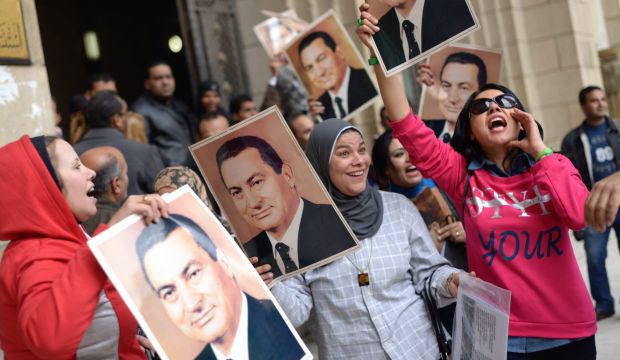
Supporters of former Egyptian president Hosni Mubarak cheer after a court overturned his conviction in an embezzlement case, in Cairo, Egypt, January 13, 2015. (EPA/BASMA FATHY / ALMASRY ALYOUM EGYPT OUT)
Mubarak, 86, was sentenced to three years in prison in May for diverting public funds earmarked to renovate presidential palaces and using the money to upgrade family properties. His two sons were given four-year jail terms in the same case.
Suffering from ill health, he has been serving his sentence in a military hospital in the upscale Maadi district of Cairo. Now that a retrial has been ordered, judicial sources say Mubarak could walk free as no convictions remain against him.
Tuesday’s verdict follows a court decision in November to drop charges against Mubarak over conspiring to kill protesters in the 2011 uprising that ended his 30-year rule.
That ruling led to protests in which at least two people were killed. Expectations that Mubarak will eventually walk free while thousands of his political opponents languish in jail have raised fears among critics that the old leadership is back.
“After the release of police officers charged with killing demonstrators and of Mubarak aides and his acquittal over the killing of protesters, this is not shocking news,” said Khaled Dawoud, spokesman for the opposition Dostour Party.
“But I don’t think Mubarak is the issue any more. The Egyptian people gave their verdict against him four years ago.”
Many Egyptians who lived through Mubarak’s rule view it as a period of autocracy and crony capitalism. His overthrow led to Egypt’s first free election. But the Islamist victor, Mohamed Mursi, was ousted in 2013 by then-army chief Abdel-Fattah El-Sisi, following protests against his rule.
Sisi, who went on to win a presidential election last May, launched a crackdown on Mursi and his Muslim Brotherhood. Authorities have jailed thousands of Brotherhood supporters and courts have sentenced hundreds to death in mass trials that have drawn international criticism.
By contrast, Mubarak-era figures are slowly being cleared of charges and a series of laws curtailing political freedoms have raised fears among activists that the rights won during 18 days of protest in Cairo’s Tahrir Square, the symbolic heart of the revolt, are being eroded.
The Court of Cassation, which ordered the retrial, did not say if Mubarak would be freed on bail pending the new trial.
Mubarak also faces retrial for a third and final time over charges of involvement in the death of demonstrators in 2011.
A source in the public prosecutor’s office said it was up to the courts that retry Mubarak whether to order his release on bail or to keep him in pretrial detention pending a verdict, suggesting he will remain incarcerated for the time being.
But his lawyer, Fareed El-Deeb, told reporters after Tuesday’s hearing that Mubarak had served the maximum permitted time in pretrial detention and should be freed.
Before his conviction in the presidential palaces embezzlement cases in May, Mubarak had been freed on that basis.
